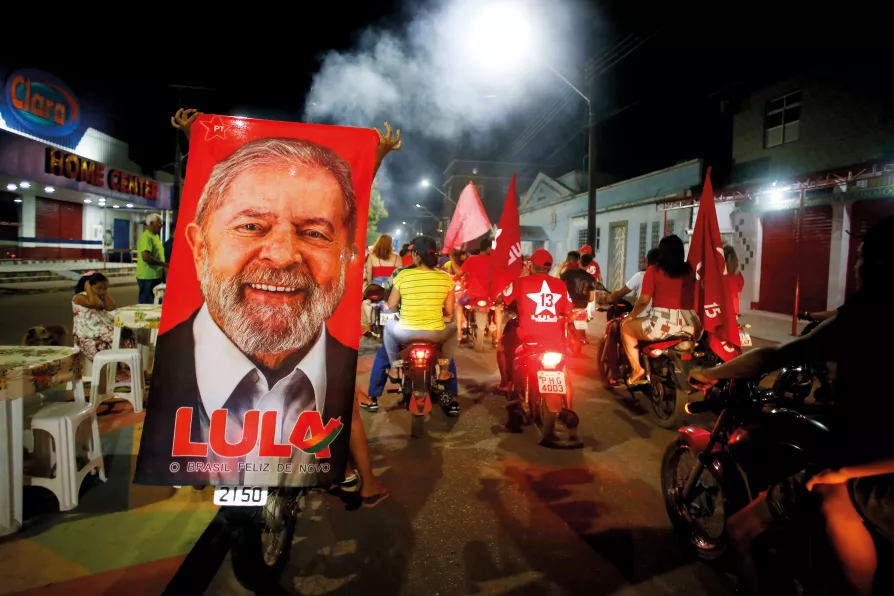From London’s holly-sellers to Engels’s flaming Christmas centrepiece, the plum pudding was more than festive fare in Victorian Britain, says KEITH FLETT

 LATIN LEFT TRIUMPANT: Workers Party supporters celebrate Lula’s victory over the right in Brazil, 2022
LATIN LEFT TRIUMPANT: Workers Party supporters celebrate Lula’s victory over the right in Brazil, 2022
LATIN AMERICA’S LEFT continues to show a better world is possible. Although defeats for the left often get more press attention, progressive governments have been elected in countries such as Bolivia, Brazil, Colombia and Honduras in recent years.
I was privileged to go to a Workers’ Party (PT) congress in Brazil prior to Lula returning to the presidency in 2022, seeing for myself how massive social movements can both resist a right-wing government and provide a basis for democracy and social progress to advance.
When returning to power, Lula immediately scrapped key policies of his far-right predecessor Jair Bolsonaro, meaning that eight state-owned companies were saved from privatisation; financial support for protecting the Amazon was reinstated; and measures on illegal mining were repealed.
Among many reforms, Brazil’s PT government has also relaunched the world-renowned anti-poverty Bolsa Familia (Family Fund) that he introduced during his first two terms of office. This has meant some 21 million Brazilian families will receive a monthly basic subsidy of $115, increasing by $29 for each child under six. As a result of this and other policies, Brazil’s poverty rates have fallen drastically.
Our comrades elsewhere are also getting on with the business of building a better society. Honduras has given free electricity to the poor and clamped down on corporate tax avoidance. Bolivia has made the right to food a reality through the Bonus Against Hunger initiative, which helped over four million people, partly funded through a wealth tax.
Meanwhile, in Colombia, tackling the gaping inequality and poverty that mires millions of people was one of the driving factors behind the election of President Gustavo Petro’s Historic Pact coalition in 2022. Since then, the government’s social reforms package — focused on healthcare, workers’ rights, pensions and education — has advanced in numerous areas, despite attempts from right-wing political forces to block and disrupt changes.
And earlier this year in Mexico, victory was spectacular. Claudia Sheinbaum — successor to President Andres Manuel Lopez Obrador (AMLO) — won the election by over 32 points.
Social gains during the Amlo years are too numerous to mention in an overview piece such as this but have included — in moves that will be of great interest to activists here — government functions that had been outsourced to private and semi-private firms being brought back in-house, and fire-and-rehire being banned.
Additionally, there have been moves towards a more universal approach to welfare and social security, with state payments now reaching 65 per cent more people than under previous governments. Furthermore, in an empowering move — and something it feels like we could only dream about currently in Britain — welfare programmes are now enshrined in the constitution as entitlements rather than “handouts.”
Meanwhile, strengthening the state-owned electricity company CFE has seen limiting the requirement on it to buy electricity from the private sector, meaning less loot for greedy private polluters and profiteers — again something we could surely do with in terms of energy here.
The lesson here is clear, namely that rolling back neoliberalism not only works, it wins for the left too. Yet — as has happened time and time again — the US empire is striking back.
As well as blockading Cuba, it has enforced heavy sanctions on Venezuela, in a bid to force “regime change” in the oil-rich country. These efforts have rightly been opposed by the aforementioned progressive governments.
And — as this article goes to press — the elected President of Honduras Xiomara Castro warned that the US was once again destabilising her country in a bit to secure “regime change,” posting on social media:
“The interference and interventionism of the US, as well as its intention to direct the politics of Honduras through its embassy and other representatives, is intolerable.
“They attack, disregard and violate with impunity the principles and practices of international law, which promote respect for the sovereignty and self-determination of peoples, non-intervention and universal peace.
“Enough. Based on our constitution and international treaties, I have ordered Chancellor Enrique Reina to denounce the extradition treaty with the US.”
We must both offer solidarity against these reactionary attacks and take inspiration from how people are fighting back through mass movements against neoliberalism and US domination.
You can follow Jess Barnard on X at @jessicalbarnard.
You can follow Labour Friends of Progressive Latin America on X @Labourfplam.
Jess will be speaking alongside guests from across Latin America at the major “Viva la Solidaridad! Stand with Latin America’s Left” event in Liverpool at 6.30pm on Monday September 23 at the Racquet Club Hotel and Ziba Restaurant, L3 9AG. Reserve a place in advance at www.bit.ly/latinamericasolidarity.

The US is desperate to stop Honduras’s process of social and democratic change, writes TIM YOUNG

DAVID RABY reports on the progressive administration in Mexico, which continues to overcome far-left wreckers on the edges of a teaching union, the murderous violence of the cartels, the ploys of the traditional right wing, and Trump’s provocations












